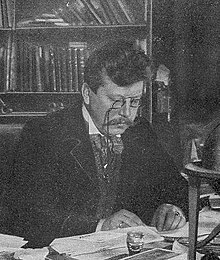
Summary
Albrecht Dieterich (2 May 1866 – 6 May 1908) was a German classical philologist and scholar of religion born in Hersfeld.
Albrecht Dieterich | |
|---|---|
| Spouse | Maria Usener |
| Children | Hermann Sr., Hermann Jr. |
| Parent | Albrecht Sr & Henriette Münscher D. |
| Academic background | |
| Thesis | PhD: Papyrus magica Musei Lugdunensis Batavi quam C. Leemans edidit in Papyrorum Graecarum tomo II, V. (Bonn, 1888) |
| Doctoral advisor | Hermann Usener |
| Influences | |
| Academic work | |
| Discipline | Classics, Philology |
| School or tradition | Eranos |
| Notable students | de:Ludwig Deubner, de:Friedrich Pfister, Eugen Fehrle, Otto Weinreich, Richard Wünsch, de:Adam Abt, Ludwig Fahz, Adolf Erman, Georg Möller, de:Karl Preisendanz |
| Influenced | |

Academic background edit
He studied at the Universities of Leipzig and Bonn. At Leipzig he studied with professors Georg Curtius, Otto Crusius and Otto Ribbeck. At Bonn he studied with Franz Bücheler, Reinhard Kekulé von Stradonitz and Hermann Usener (1834–1905).[1] Usener in 1899 became Dieterich's father-in-law. In 1888 he earned his doctorate, and three years later received his habilitation in Marburg with a dissertation on Orphism. He had come to Marburg on the insistence of Georg Wissowa and even contributed the entry on Aeschylus in the Pauly-Wissowa Realencyclopädie der classischen Altertumswissenschaft.[2] For his Staatsexamen, he chose the theme 'What do we know about Plato's theism or pantheism?'. Afterwards he traveled to Italy and Greece for research purposes during the years 1892-1895.
In 1895 he returned to Marburg as an associate professor, and two years later succeeded Eduard Schwartz (1858–1940) as chair of classical philology at the University of Giessen. From 1903 till his death in 1908, he was a full professor at the University of Heidelberg. He was working on his magnum opis, the Geschichte des Untergangs der antiken Religion, a detailed critical study of classical religion, but was unable to complete it.
In 1903, he co-founded the study group Eranos with a fellow Marburg student, Gustav Adolf Deissmann. The two, along with Wissowa and Wilhelm Schulze, were part of a daily Tischrunde 'von glücklischter Zusammensetzung', an informal learned society of Classics scholars.[3]
He died at Heidelberg from cerebral apoplexy.
Ideas edit
Dieterich was notable for identifying the origin & use of manuum vellatio. He notes that the ritual was originally Persian, brought to the West by Alexander the Great, interwoven into the worship of Isis and then seeped into the Roman sphere of influence. Dieterich cites the works of Constantine VII Porphyrogenitus, which noted the ritual being used from Diocletian's time till the Byzantine period.[4]
Dieterich also noted parallels between the myths of the Pythian Dragon, the birth of Apollo to Leto and the Woman of the Apocalypse.[5]
Works edit
Much of Dieterich's work involved research of traditional beliefs, mythology and religion of the Greco-Roman world. He was the author of an influential work titled "Abraxas: Studien zur Religionsgeschichte des spätern Altertums", a study based on a magical papyri that was housed at the Lateran Museum.[6] In 1903 he published "Eine Mithrasliturgie", in which he proposed that lines 475 – 834 of the Paris Magical Papyrus contained the official liturgy of the Mithras Cult. His theory was met with skepticism and criticized by several scholars in regards to the Mithraic origin of the liturgy.[7] He participated in a long standing debate with Franz Cumont over his Mithraic interpretation of the papyrus.[8] Other significant works by Dieterich include:
- De hymnis Orphicis capitula quinque (Marburg, 1891).
- Nekyia: Beiträge zur Erklärung der neuentdeckten Petrusapokalypse, (1893) – Nekyia; contributions to the explanation of the newly revealed Apocalypse of Peter.
- Die Grabschrift des Aberkios, (1896) – The grave inscriptions of Aberkios.
- Mutter Erde, (1905) – Mother Earth.
- Kleine Schriften, (1911). Richard Wünsch (ed). – Smaller works.
- Pulcinella: pompejanische Wandbilder und römische Satyrspiele (Leipzig, 1897). Comic characters from classical antiquity to contemporary times.
- de:Archiv fur Religionwissenschaft (edited 1904 with Thomas Achelis, 1905-1908 sole editor)
- de:Religionsgeschichtliche Versuche und Vorarbeiten (1902-1908)
- Papyri Graecea Magicae: Compiled papyri which were published posthumously in two editions.
Notes edit
- ^ "DIETERICH, Albrecht". dbcs.rutgers.edu. Database of Classical Scholars, Rutgers University. Retrieved 2023-12-16.
- ^ Marchand, Suzanne (2003). "From Liberalism to Neoromanticism: Albrecht Dieterich, Richard Reitzenstein, and the Religious Turn in "Fin-De-Siècle" German Classical Studies". Bulletin of the Institute of Classical Studies. Supplement (79): 129–160. ISSN 2398-3264. JSTOR 43768160.
- ^ Gerber, Albrecht (2010-03-26). Deissmann the Philologist (in German). Walter de Gruyter. pp. 69–70, 109. ISBN 978-3-11-022432-0.
- ^ Gardner, Gregg; Osterloh, Kevin Lee (2008). Antiquity in Antiquity: Jewish and Christian Pasts in the Greco-Roman World. Mohr Siebeck. p. 271. ISBN 978-3-16-149411-6.
- ^ Benko, Stephen (2004). The Virgin Goddess: Studies in the Pagan and Christian Roots of Mariology. BRILL. p. 85. ISBN 978-90-04-13639-7.
- ^ Richard Turcan (1987). "Dieterich, Albrecht | Encyclopedia.com". www.encyclopedia.com. Retrieved 2023-12-16.
- ^ Meyer, Marvin W. (1976). The "Mithras liturgy". Missoula, MT: Scholars Press for the Society of Biblical Literature. ISBN 0891301135.
- ^ Faraone, Christopher A.; Obbink, Dirk (1997-02-13). Magika Hiera: Ancient Greek Magic and Religion. Oxford University Press. p. 252. ISBN 978-0-19-028319-3.
References edit
- Stephan A. Hoeller, The gnostic Jung and The Seven Sermons to the dead Quest Books, 1982, page 92. ISBN 978-0-8356-0568-7
- "This article incorporates text from an equivalent article at the German Wikipedia"; which includes Dieterich, Albrecht In: Neue Deutsche Biographie (NDB). Band 3, Duncker & Humblot, Berlin 1957, ISBN 3-428-00184-2, S. 669 f.
External links edit
- Works by Albrecht Dieterich at Open Library


